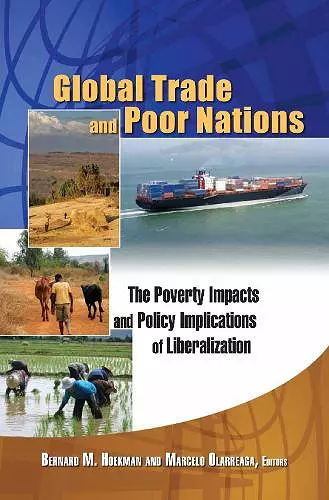Global Trade and Poor Nations
The Poverty Impacts and Policy Implications of Liberalization
Marcelo Olarreaga editor Ernesto Zedillo editor Bernard M Hoekman editor
Format:Paperback
Publisher:Bloomsbury Publishing PLC
Published:27th Jul '07
Currently unavailable, and unfortunately no date known when it will be back

"No trade policy issue is more urgent than the connection between liberalization and poverty. This path-breaking volume examines the potential consequences of global trade reform for poor countries. The results are sobering. Significant benefits depend on complementary domestic initiatives well outside the realm of trade negotiations." --Gary Clyde Hufbauer, Peterson Institute for International Economics "This volume provides valuable analytical links between international trade and poverty alleviation. It is especially useful by emphasizing that trade liberalization, with or without a successful Doha Round, needs to be complemented by specific 'aid for trade' measures, domestic and international, if poor countries and poor people in poor countries are to share in the benefits of trade." --Gustav Ranis, Yale University "Contrary to the populist nonsense so fashionable among uninformed critics and a handful of economists, this book argues convincingly that trade liberalization is good for poor countries. But it also underlines the wisdom of complementary measures to assist these countries. This is an important book that will advance the anti-poverty agenda immeasurably. One hopes that Bono can read, not just sing!" --Jagdish Bhagwati, Columbia University "Detailed product-level analyses of the distributional implications of tariff changes combined with estimates of the impact of multilateral liberalization make this volume a significant contribution to better understanding the effects of trade liberalization on poverty in poor countries." --Jaime De Melo, University of Geneva
This thoughtful volume assesses the likely impact of reformed trade policies on the poorest of the poor —those on the bottom economic rungs in developing nations.This thoughtful volume assesses the likely impact of reformed trade policies on the poorest of the poorthose on the bottom economic rungs in developing nations. The focus on a spectrum of poor nations across different regions provides some helpful and hopeful guidelines regarding the likely impacts of a global trade reform, agreed upon under the auspices of the World Trade Organization, as well as the impact of such reforms on economic development. In order to facilitate lesson-drawing across different regions, each country study utilizes a similar methodology. They combine information on trade policy at the product level with income and consumption data at the household level, thus capturing effects both on the macro level and in individual households where development policies ideally should improve day-to-day life. This uniformity of research approach across the country studies allows for a deeper and more robust comparison of results.
"No trade policy issue is more urgent than the connection between liberalization and poverty. This path-breaking volume examines the potential consequences of global trade reform for poor countries. The results are sobering. Significant benefits depend on complementary domestic initiatives well outside the realm of trade negotiations." —Gary Clyde Hufbauer, Peterson Institute for International Economics
|"This volume provides valuable analytical links between international trade and poverty alleviation. It is especially useful by emphasizing that trade liberalization, with or without a successful Doha Round, needs to be complemented by specific 'aid for trade' measures, domestic and international, if poor countries and poor people in poor countries are to share in the benefits of trade." —Gustav Ranis, Yale University
|"Contrary to the populist nonsense so fashionable among uninformed critics and a handful of economists, this book argues convincingly that trade liberalization is good for poor countries. But it also underlines the wisdom of complementary measures to assist these countries. This is an important book that will advance the anti-poverty agenda immeasurably. One hopes that Bono can read, not just sing!" —Jagdish Bhagwati, Columbia University
|"Detailed product-level analyses of the distributional implications of tariff changes combined with estimates of the impact of multilateral liberalization make this volume a significant contribution to better understanding the effects of trade liberalization on poverty in poor countries." —Jaime De Melo, University of Geneva
|"Well written and carefully laid out, this work is organized in three parts: an overview of the challenges of poverty reduction via trade reform and an estimation of the effects of global trade reform; the results of the seven country studies; and policy implications of trade liberalization....This book is unquestionably required reading for policy makers contemplating policy and trade reforms that can help their poor countries develop and in turn improve the lot of poor people living in these economies. Highly recommended." — CHOICE
ISBN: 9780815736714
Dimensions: 234mm x 158mm x 18mm
Weight: 386g
264 pages